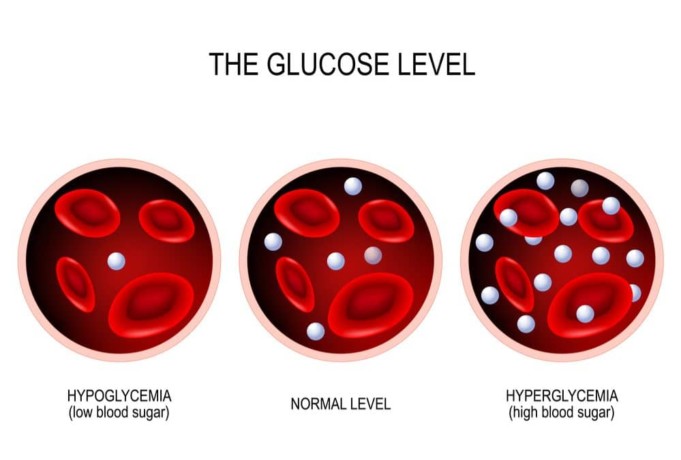Blood sugar also called glucose is gotten from food and is an important source of energy for the body. Glucose is mainly gotten from carbohydrate food such as bread, cereals, rice, potatoes, vegetables and milk. Glucose is absorbed into the bloodstream after you have eaten.
When you eat too much glucose than your body needs, the body stores the excess glucose in the liver and muscles or change it to fat so that it can be used for energy when its needed.
And without enough glucose, the body does not perform its normal functions. However, there are times when your blood sugar may be too low (hypoglycemia) or too high (hyperglycemia).
Low Blood Sugar: Symptoms, Causes and Treatment options
Hypoglycemia or Low blood sugar is a condition that occurs when the blood glucose is too low to sustain the body’s normal functioning. It is common with people who are diabetic when they start carefully managing the condition.
Causes of Low Blood Sugar
Hypoglycemia can be caused when managing diabetes and other medical conditions. Possible causes may include;
- Diabetes
- Excessive alcohol consumption
- Over production of insulin
- Some severe illness
- Diabetics: When you don’t eat enough food after taking diabetes medication or exercise more than you should.
- Excessive Alcohol Consumption: Drinking alcohol heavily without eating may block the liver from releasing stored glucose into the bloodstream resulting in hypoglycemia.
- Over Production of Insulin: Insulinoma or tumour of the pancreas may lead to overproduction of insulin resulting to low blood sugar.
- Some Severe Illness: some severe illness of the liver such as hepatitis or kidney disorder can lead to hypoglycemia.
Symptoms of Low Blood Sugar
- Blurry vision
- Pale skin
- Dizziness
- Sweating
- Headache
- Unexpected fatigue
- Hunger
- Difficulty in sleeping
- Loss of consciousness
- Rapid heartbeat
- Fainting
Treatment Options
Treatment options for low blood sugar may include;
- Check your blood sugar level regularly
- If your sugar level often drops when you have not eaten, always have a snack before going to bed.
- Take sugary food once a while.
High Blood Sugar: Symptoms, Causes and Treatment Options
High blood sugar (hyperglycemia) is a condition that occurs when the blood glucose builds up in the bloodstream. It is mostly common in people with diabetes because they are unable to use insulin effectively.
Causes of High Blood Sugar
Some possible causes of high blood sugar may include the following;
- Eating too much grams of carbohydrates.
- When a diabetic patient skips glucose-lowering medications.
- Exercising less than usual.
- Infection or illness.
- Using certain medications.
Symptoms of High Blood Sugar
- Increased thirst
- Frequent urination
- Loss of weight
- Blurred vision
- Headache
Treatment Options
- Exercising More: Involving yourself in exercise can help to lower your blood sugar but make sure you ask your doctor the kind of exercise that is right for you.
- Drink More Water: Drinking more water helps to lower blood sugar as water helps to remove excess sugar from the blood through urination.
- Change your diet: You may need to change the type of food you eat in order to regulate your sugar level.
- Change of medication: You may need to see your doctor to change the timing, amount or types of types of medication you take especially for people who are diabetic.
How to Prevent High Blood Sugar?
To keep your blood sugar in check and prevent you from high blood sugar problems, you should consider the follow;
- Go for a regular blood sugar test.
- Do a meal plan.
- Exercise regularly












